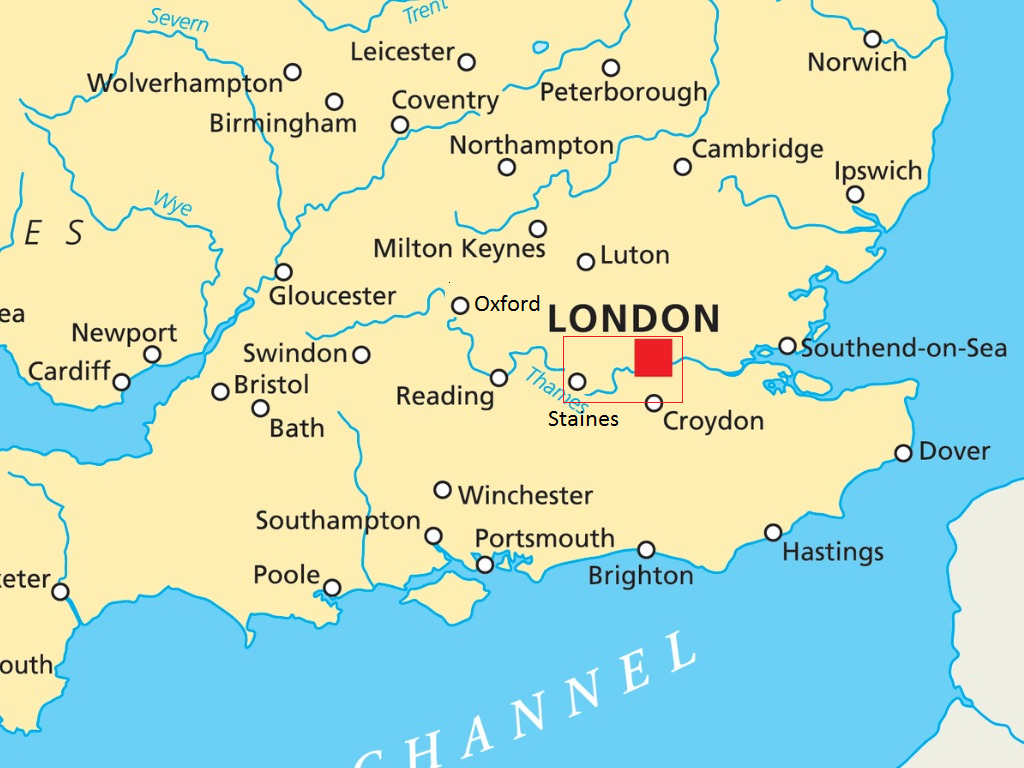Staines to Woolwich – Moderate
4 walking days
5 nights accommodation
Walking distance 50 miles
We start the itinerary in Staines. An important river crossing in Roman times, the town is now a busy commercial centre with a railway station that takes you to London in one direction and Reading in the other. The walk is the last in our “Moderate” series, taking you through the sprawling suburbs of West London until you reach the capital on the penultimate day. The Thames Path at the Thames Barrier but was recently extended by 1.2 miles to Woolwich where it links with the English Coastal Path.
The Path is well signposted and follows the riverbank all the time. Aside from the morning of the first day, when you walk across fields, you will be walking on a tow path which is made from gravel or tarmac. Trainers are therefore perfectly acceptable. However, surface water can accumulate at any time following heavy rains.
You are never far from shops and restaurants.
From the second day onwards you will have a choice of walking down the left bank or the right bank. Because there are many sites to see, you can chop and change depending on what interests you by crossing one of the many bridges along the way.
Although this is largely an urban walk, there is still a lot of greenery. There are many tourist sights to see along the way and you should plan ahead to decide what you might like to visit.

Day 0 Arrive at The Boleyn, Staines
Despite its modern appearance, Staines is very old indeed being an important river crossing in Roman times. It’s now an important railway junction and therefore a convenient place to start this section with trains to Reading and London Waterloo.
You will be staying at the Boleyn Hotel in the old quarter of town. The hotel lies quietly away from the busy modern commercial centre that dominates Staines. The hotel features its own Indian restaurant and there are plenty of other options for dining back across the bridge.

Day 1 Staines to Hampton Court 12.4 miles
The Journey
Leaving Staines you will be walking by the river with back gardens to your left and the river to your right. After four miles you reach Chertsey Bridge. The town of Chertsey is a good mile away but there are two pubs and a shop close to the bridge which might make a convenient lunch stop.
Passing through the last fields of the Path (the rest of the path is firm underfoot with either gravel or tarmac) you soon arrive at Shepperton Lock where a treat awaits. The Path continues on the other side of the river and a boat will take you across for a nominal fee. Although it leaves every 15 minutes you must still ring the ship’s bell!
Once on the other side you follow the “cut” to Walton where there is a welcome café by the bridge. Leaving Walton you will see the picturesque town of Sunbury on the other side of the river. There’s no way to cross. Instead you must content yourself with the reservoirs that line your side of the Thames, some of which are now nature reserves. You complete your journey to Hampton Court admiring the many houseboats that line the river.
The Destination
The Thames Path conveniently crosses the bridge at Hampton Court to where the Palace lies. The Palace was built by Cardinal Wolsey during the reign of Henry VIII. He gave it to Henry in 1529 in an effort to stay in his favour having failed to get the Pope to grant an anullment for his marriage to Catherine of Aragon. Wolsey died a year later. The Palace was one of Henry’s favourites and still belongs to the Crown. The Palace, with its Great Hall, Tudor kitchens and extensive gardens and maze is well worth visiting.
You will stay at the King’s Arms. Steeped in history and looking over Hampton Court Palace to one side and the lovely Bushy Park on the other, the hotel has oodles of charm, dating back to 1709. A lovely Georgian building, the rooms are all different in shape, size, aspect and design, some of which overlook the maze.
The hotel lies across a road from Bushy Park where the Diana Fountain can be seen.
Day 2 Hampton Court to Kew 10.8 miles
The Journey
From Hampton Court the river starts to meander as it works its way into London through the suburban towns of Kingston, Teddington, Twickenham, Richmond and Isleworth. From Teddington, where the river becomes tidal, you have the choice of walking on the right or left banks. This option is available all the way to Greenwich, close to the end of the Thames Path. As there are a number of places along the way for you to visit, your choice of which side may be influenced by these.
On the right bank is Ham House, a National Trust property. And you will also pass the back of Kew Gardens as well as one of the entrances. The right bank is surprisingly green considering that we’re only 10 miles from the capital.
The left bank is more urban, passing through Twickenham and Isleworth. You will also walk past Syon House, the home of the Duke of Northumberland, and Marble Hill.
The Destination
Kew Bridge separates the lovely village of Kew on the right bank from Brentford on the left. The main attraction here is the Royal Botanic Gardens, a complex of 326 acres filled with one of the most diverse collection of plants in the world. The gardens are open from 10am to 6pm so, hopefully, you’ve arrived early enough to sneak in!
The Coach and Horses is a rather fabulous hotel overlooking Kew Green. There is a bright and airy dining room and a suntrap patio and hidden garden. Kew Gardens is just a short walk away.
Day 3 Kew to Westminster 12.9 miles
The Journey
Once again you have a choice of walking on the left or right banks although you can switch at any of the 14 bridges you will pass. The right bank has more greenery, passing the aptly-named Leg O’ Mutton pond, and skirts the back of the London Wetland Centre before arriving at Putney, where you could refill at the Putney Pie shop. Downstream from here it becomes more urban as you pass through Wandsworth, Battersea Park with its famous Pagoda, and Battersea Power station which is in the process of being redeveloped. The final stretch of your journey will take you past the MI5 building, featured in recent James Bond movies, and Lambeth Palace, home of the Archbishop of Canterbury, to Westminster Bridge.
The left bank takes you through the delightful village of Strand on the Green, past the playing fields of Duke’s Meadow and into Chiswick where you can visit Fuller’s Brewery or, more cultured, the house of the celebrated 18th century painter, William Hogarth.
The path carries on past Hammersmith to Fulham where you will pass Fulham Palace, the former home of the Archbishop of London, and you can admire the London Plane Trees. Past Fulham is Chelsea with its harbour, and the Physic Garden. Your walk ends dramatically at the Houses of Parliament and Westminster Bridge.
The Destination
Westminster is home to the Houses of Parliament and its famous Abbey. Hopefully you will still have energy to see some of the sights here: the Churchill War Rooms and the National Gallery. Westminster Bridge connects the Houses of Parliament with Waterloo where, if you are feeling weary, you can enjoy a ride on the London Eye where you will get the best view in London.
You will be staying at the Marlin, Waterloo. The hotel comes with a bar and a fitness centre (as if you’ll need one!) The hotel is located close to the right bank of the river by Westminster Bridge.
Day 4 Westminster to Woolwich 14.2 miles
The Journey
The 2.4 miles between Westminster and Tower Bridges are packed with tourist sites. From the right bank, not only will you have glorious views of St Paul’s Cathedral and The Tower of London (there are plenty of bridges if you want to cross over to get up close), you will also pass the Tate Modern, the Globe Theatre, the Golden Hinde, and HMS Belfast.
Tower Bridge is the last bridge on the Thames. Between here and Greenwich you must choose between right and left banks. On the right are the districts of Bermondsey, Rotherhithe and Deptford, mostly regenerated land but with the occasional historic gem: The Mayflower Pub named after the ship that set sail from Rotherhithe and landed in Cape Cod, 400 years ago. Almost next door is the Brunel Museum dedicated to the pioneering engineer whose works we see so much of on the Thames Path.
The left bank takes you through the lovely St Katherine’s Docks and into Wapping. Stop for a pint at Ian McKellan’s pub, The Grapes, where Charles Dickens used to frequent. On both sides you can step down to the beached shoreline and try some mudlarking – hunting for relics. Past Wapping you walk through Canary Wharf where you can marvel at how this area has been transformed from decaying docklands to a financial hub. Past Canary Wharf you walk under the Thames via a foot tunnel to re-emerge at Greenwich.
Although you will be staying at Greenwich tonight you must press on to the finish. It’s not pretty by any means but the peninsula of North Greenwich, with the O2 arena at its zenith, is nonetheless interesting. Once round the peninsula you will see the Thames Barrier and, after a further 1.2 miles, Woolwich, the (new) end of the Thames Path.
The Destination
The Thames Barrier was built in 1982 to prevent rising sea levels from flooding the Thames. The Thames Path used to finish here but it was recently extended to Woolwich, where it meet the England Coast Path. Woolwich was once home to the Royal Arsenal and you can admire the historic buildings which have been tastefully converted into flats, offices, bars and shops.
You will be returning to Greenwich for your overnight stay as there is nothing suitable in Woolwich. There are a number of public transport options but the best way is to catch the Thames Clipper boat service to Greenwich arriving in style.
Your hotel, The Admiral Hardy, lies next to historic Greenwich Market in the historic centre of town. There are plenty of restaurants nearby.
Hopefully you will have time to explore Greenwich. Greenwich was the site of a Royal Palace. It was knocked down by Charles II in 1660 to make way for the Royal Naval College which now houses the National Maritime Museum. You can also visit the Royal Observatory although that will involve a 0.6 mile walk up a hill. Maybe next time?
Prices
Prices inclusive of bed and breakfast plus baggage transfer between hotels. A map and guide book is also included. You will have unlimited access to our local team in the event of difficulties.
Price per person assuming shared occupancy: £785
Price per person assuming single occupancy: £1,230
Rest days can be purchased but prices vary depending on category of hotel.

